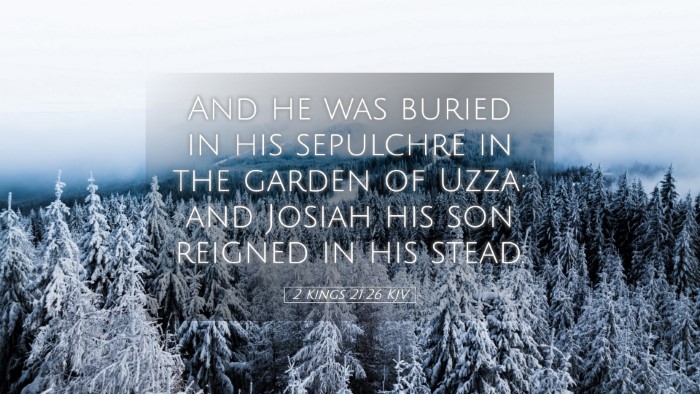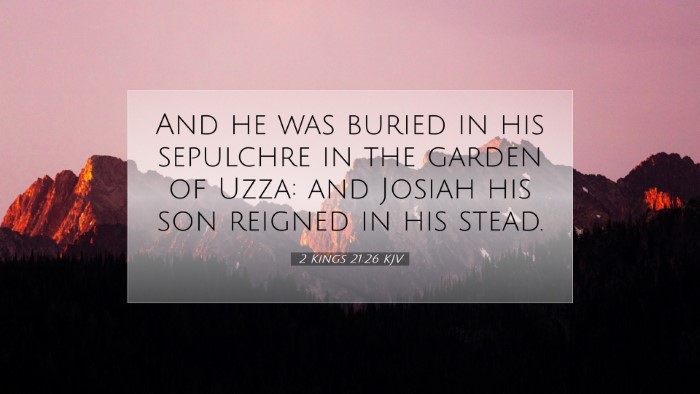Commentary on 2 Kings 21:26
Verse: "And he was buried in his own house, in the garden of Uzza: and Ahaziah his son reigned in his stead."
Context and Overview
2 Kings 21:26 marks a pivotal moment in the narrative of the book of Kings, concluding the reign of one of Judah's more notorious kings, Manasseh. To fully understand this verse, it is essential to consider the historical context, the actions of Manasseh, and the significance of his burial and succession.
Historical Context
Manasseh's reign lasted for fifty-five years and is frequently characterized by significant spiritual and moral deterioration within Judah. He restored the worship of Baal, engaged in idolatrous practices, and even sacrificed his own son—actions that were an abomination in the eyes of the Lord. This context reveals the depths of Israel's rebellion and the challenges faced by subsequent rulers.
Insights from Public Domain Commentaries
1. Commentary by Matthew Henry
Matthew Henry reflects on the deep implications of Manasseh's rule and his eventual death. He highlights that despite the severe sins committed by Manasseh, there was an opportunity for repentance—a theme prevalent throughout Scripture. Henry notes the irony of Manasseh being buried in his own house, implying a certain honor, despite a life riddled with idolatry and heinous acts. The garden of Uzza, a personal and rather idle location, serves as a stark contrast to the spiritual barrenness he left behind.
2. Commentary by Albert Barnes
Albert Barnes provides a historical interpretation of Manasseh's death. He points out that Manasseh was not buried in the sepulchers of the kings but rather in his own garden, emphasizing a disconnect from the monarchy's honor due to his actions. Barnes discusses how Manasseh's reign set the stage for his son, Ahaziah, to rule, indicating a continuation of the consequences of Manasseh's transgressions. Furthermore, Barnes elaborates on the significance of Ahaziah's succession, suggesting that the effects of Manasseh's sins were to be felt in the leadership of Judah henceforth.
3. Commentary by Adam Clarke
Adam Clarke's observations delve into the nature of Ahaziah's ascent to the throne following Manasseh's death. Clarke suggests that there was a need for reform following the reign of such a profoundly sinful king. He emphasizes the potential for spiritual renewal, however bleak the circumstances may appear. Clarke also comments on the burial practices of that era and suggests that Manasseh’s fate, being buried in a common space yet associated with the garden of Uzza, speaks to a form of dishonor due to his idolatrous legacy.
Theological Implications
This verse encapsulates critical theological themes, such as:
- Authority and Leadership: The verse prompts reflection on the impact of a leader's actions on their successors and the nation as a whole.
- Judgment and Mercy: Manasseh's life illustrates the dual themes of divine judgment against sin and the possibility of redemption, underscoring God's enduring grace.
- Legacy: The notion of legacy is paramount; the consequences of Manasseh's reign would linger in Judah's spiritual landscape long after his death.
- Hope for Reformation: Ahaziah’s reign, and future reforms highlight the continuing hope present in biblical narratives for returning to faithfulness to God.
Conclusion
In summary, 2 Kings 21:26 is not merely a statistic about the end of one king's reign and the beginning of another's; it is a profound commentary on the nature of leadership, the gravity of sin, and the ever-present hope for redemption within the Biblical narrative. The insights from Matthew Henry, Albert Barnes, and Adam Clarke collectively emphasize the need to apprehend the implications of a leader's life, the importance of repentance, and the hope of spiritual renewal in the face of profound disappointment and disobedience.


